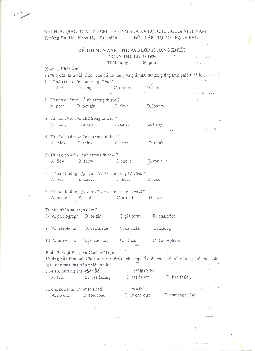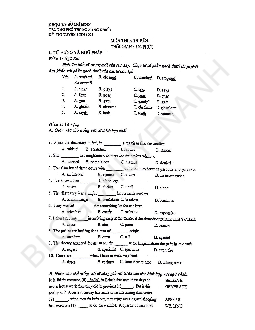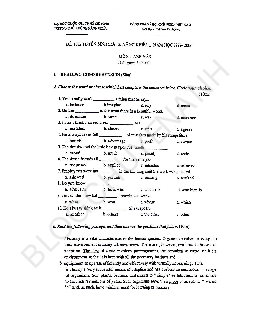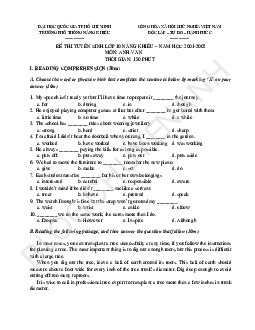





Preview text:
THỪA THIÊN HUẾ
Mark the letter A, B, C, or D to indicate the word whose underlined part differs from the other three in
pronunciation in each of the following questions from 1 to 4.
Question 1. A. lake B. flat C. shape D. game A. /leɪk/ B. /flæt/ C. /ʃeɪp/ D. /ɡeɪm/
Question 2. A. travelled B. succeeded C. behaved D. combined A. /ˈtrævld/ B. /səkˈsiːdɪd/ C. /bɪˈheɪvd/ D. /kəmˈbaɪnd/
Question 3. A. gather B. although C. breathtaking D. feather A. /ˈɡæðər/ B. /ɔːlˈðəʊ/ C. /ˈbreθteɪkɪŋ/ D. /ˈfeðər/
Question 4. A. trousers B. jeans C. shoes D. pants A. /ˈtraʊzərz/ B. /dʒiːnz/ C. /ʃuːz/ D. /pænts/
Mark the letter A, B, C, or D to indicate the word that differs from the other three in the position of primary stress in
the following questions from 5 to 6.
Question 5. A. contestant B. decision C. mechanic D. volunteer A. /kənˈtestənt/ B. /dɪˈsɪʒn/ C. /məˈkænɪk/ D. /ˌvɑːlənˈtɪr/ Question 6. A. happy B. urban C. famous D. aware A. /ˈhæpi/ B. /ˈɜːbən/ C. /ˈfeɪməs/ D. /əˈwer/
Mark the letter A, B, C, or D on your answer sheet to indicate the most suitable response to complete each
of the following exchanges from 7 to 8.
Question 7. Tom is at Linda’s house for dinner.
- Tom: “Thank you for you’re a lovely evening” - Linda: “ ” A. Have a good day B. You’re welcome. C. Thanks D. Cheers. ●
Have a good day: Chúc một ngày tốt lành ●
You’re welcome: Không có gì (thường được đáp lại sau lời cảm ơn) ● Cheers ~ Thank you ~ Goodbye
Question 8. Susan wants to borrow a bike from Mike.
- Susan: “Is it all right if I use your bike?” - Mike: “ ” A. Sure, go ahead. B. It may be wrong C. Ok, I hope not. D. The same to you. ●
Sure, go ahead: Được thôi, cứ tự nhiên ●
It may be wrong: Nó có thể sai ●
Ok, I hope not: Được, tôi hy vọng là không ● The same to you: Giống bạn
Mark the letter A, B, C, or D on your answer sheet to indicate the word(s) that is OPPOSITE in meaning
to the underlined word(s) in each of the following questions from 9 to 10.
Question 9. Let’s wait here for her. I’m sure she’ll turn up before long. A. leave B. arrive C. visit D. enter ●
Turn up (Phrasal verb): xuất hiện, đến >< Leave (v) rời đi ● Arrive /əˈraɪv/ (v) đến ● Visit /ˈvɪzɪt/(v) thăm ● Enter /ˈentər/ (v) đi vào
Question 10. Many people feel nervous when they first make a speech in public. A. impressed B. fearful C. confident D. upset ●
Nervous /ˈnɜːrvəs/ (a) bồn chồn, lo lắng >< Confident /ˈkɑːnfɪdənt/ (a) tự tin ●
Impressed /ɪmˈprest/ (a) ấn tượng ●
Upset /ˌʌpˈset/ (v) làm bối rối, làm lo ngại
Mark the letter A, B, C, or D on your answer sheet to indicate the underlined part that needs correction in
each of the following questions from 11 to 14.
Question 11. The aim of these courses are to improve students’ language skills. A. of B. skills C. students’ D. are are → is ●
The aim of N(ít/ nhiều) + V (chia số ít)
Question 12. If you went to my birthday party, you will meet a lot of new friends. A. if B. new friends C. a lot D. went went → go ●
Cấu trúc câu điều kiện loại 1: If + S + V (simple present), S + will/can/shall + V
Question 13. Tom’s jokes are inappropriate but we have to put up with it just because he’s the boss. A. have to B. because C. jokes D. it it → them ●
Put up with sth (phrasal verb) chịu đựng
Question 14. Some people think it’s hard to study academic and vocational subject at a same time. A. a B. hard C. Some D. and a → the ●
At the same time: đồng thời, cùng một lúc
Read the text below and mark the letter A, B, C, or D on your answer sheet to indicate the correct answer
to each of the questions from 15 to 19. Exercise can be fun!
Exercise has become a huge part of our world. There are gyms everywhere, but if you’re not keen on them, there are
hundreds of exercise videos to choose from. Exercise is good for you. It makes you feel better, look better and can help you live longer.
But what happens if you are the kind of person who would do anything rather than spend five minutes
on an exercise bike, including cleaning the house, visiting a boring relative or watching a terrible TV
programme? If you are that kind of person, you need a plan!
First of all, decide when you are going to exercise. Choose three times a week, like me. Write EXERCISE in
your diary, on your calendar, on the wall if necessary! Then make sure you do it. Don’t do anything else. I never make other arrangements.
Next, vary what you do. I went to the same aerobics class for two years! No wonder I was bored! Now I use
different machines at the gyms, I often change my jogging route and I never do aerobics.
Make exercise fun and find an exercise you enjoy. Why not play a sport, or join a dance class? I recently
started a modem dance class. It’s great fun and I’ve met lots of new people, but as soon as I get bored, I’ll find something else!
Question 15. What is the writer’s main aim in writing the text?
A. to describe different ways of keeping fit.
B. to talk about the exercise classes she goes to.
C. to persuade people of the benefits of exercise.
D. to encourage people to take exercise. ●
Key: Make exercise fun and find an exercise you enjoy…
Question 16. What is the phrase “keen on” in paragraph 1 closest in meaning to ? A. frightened of B. scared of C. fond of D. afraid of ●
Keen on (adj) = fond of (adj): yêu thích
Question 17. What does the word “it” in paragraph 3 refer to? A. anything B. calendar C. exercise D. diary
Question 18. What does the writer say about herself?
A. She isn’t keen on joining classes.
B. She prefers to exercise at home.
C. She likes to do different kinds of exercises
D. She doesn’t like watching TV programmes. ●
Key: Now I use different machines at the gyms, I often change my jogging route and I never do aerobics.
Question 19. What does she say about her dance class? A. She may not do it forever.
B. She thinks some people in her dance class are unfriendly. C. She often finds it boring.
D. She prefers doing sports to taking part in her dance class. ●
Key: I recently started a modem dance class. It’s great fun and I’ve met lots of new people, but as soon as
I get bored, I’ll find something else!
Mark the letter A, B, C or D on your answer sheet to indicate the correct answer to each of the
following questions from20 t0 32
Question 20. I think there’s a lot to say about online learning, ? A. is it B. isn’t it C. isn’t there D. is there ●
Câu hỏi đuôi I + động từ tình thái (feel, think, expect,…) + clause, thì phần câu hỏi đuôi sẽ được chia theo mệnh đề phụ trong câu. Question 21. Women
from most housework by high technology. A. free B. will be freed C. freed D. will free ●
Cấu trúc câu bị động: S + be( chia) + V3/ed + by O ( S:đối tượng bị tác động bởi hành động)
Question 22. It’s difficult to changes in technology. A. take care of B. look through C. keep up with D. get up ● Take care of: chăm sóc ● Look through: nhìn qua ●
Keep up with: bắt kịp, theo kịp ● Get up: ngủ dậy
Question 23. My new school, which you visited two days ago, is _ the old one. A. bigger B. the biggest C. bigger than D. biggest Công thức so sánh hơn: ●
* Nếu từ chỉ có 1 âm tiết: ADJ/ADV + đuôi -er + than ●
* Nếu từ có 2 âm tiết trở lên: more + ADJ/ADV + than
Question 24. Students often listen attentively their teachers. A. at B. with C. for D. to ●
Listen to sb (v) lắng nghe ai Question 25. I wish I
English well in order to study abroad. A. could speak B. can speak C. will speak D. may speak ●
Câu ước: S + wish(es) + (that) + S + V-ed/were/p2
Question 26. Mr. Nam said that .
A. he visits Singapore the following years
B. he visited Singapore the following year
C. he had visited Singapore the year before
D. he has visited Singapore the year before ●
Câu tường thuật: S + say(s) / said + (that) + S + V( lùi thì)
says / say to + O => tells / tell + O said to + O => told + O
Question 27. By the time Alex
15 years old, he had been in London for over eight years. A. will be B. had been C. is D. was
By the time trong câu phức Quá khứ Đơn – Quá khứ Hoàn thành
● By the time + S1 + V2/V-ed (động từ thường) +… + , + S2 + Had + V3/V-ed (động từ thường) + …
● By the time + S1 + was/were (động từ to-be) +… + , + S2 + Had + been (động từ to-be) + …
Question 28. My children enjoy to the Water Park. A. take B. being taken C. to take D. to be taken ● Enjoy + V-ing: thích
Question 29. Too many tests and exams have put students under . A. excitement B. interest C. pressure D. influence
● Put SO under pressure: tạo áp lực cho ai
Question 30. She walked home by herself although she knew that it was . A. dangerously B. endanger C. danger D. dangerous
● Dangerously (adv) một cách nguy hiểm
● Endanger /ɪnˈdeɪndʒər/ (v) gây nguy hiểm
● Danger /ˈdeɪndʒər/ (n) mối nguy hiểm
● Dangerous /ˈdeɪndʒərəs/ (adj) nguy hiểm
Question 31. The teacher suggested that _ carefully for the exam. A. we should review B. reviewing C. we must review D. to review ●
S + (suggest) that + S + (should) + V…: Đề xuất rằng ai đó nên làm gì đó.
Question 32. A survey is being _
to find out what the students think of the school. A. conducted B. operated C. explored D. carried ●
Conduct /kənˈdʌkt/ (v) tiến hành ●
Operate /ˈɑːpəreɪt/ (v) hoạt động ●
Explore /ɪkˈsplɔːr/ (v) khám phá ● Carry /ˈkæri/ (v) mang, vác
Mark the letter A, B, C or D on your answer sheet to indicate the sentence that best COMBINES each
of sentences in the following questions from 33 to 36.
Question 33. Ms. Young is a dedicated teacher. I admire her very much.
A. Ms. Young, whom I admire very much, is a dedicated teacher.
B. Ms. Young, who I admire her very much, is a dedicated teacher.
C. Ms. Young, that I admire her very much, is a dedicated teacher.
D. Ms. Young, which I admire very much, is a dedicated teacher. Mệnh đề quan hệ: ●
‘who’ Làm chủ ngữ hoặc tân ngữ, thay thế cho danh từ chỉ người. ●
‘whom’ Làm tân ngữ, thay thế cho danh từ chỉ người. ●
‘that’ Làm chủ ngữ hoặc tân ngữ, thay cho cả danh từ chỉ người và danh từ chỉ vật. (trước ‘that’ không có dấu phẩy) ●
‘which’ Làm chủ ngữ hoặc tân ngữ, thay thế cho danh từ chỉ vật.
Question 34. It rained heavily. However, the game continued.
A. The game didn’t continue in spite of the heavy rain.
B. Although it rained heavily, the game continued.
C. The game continued because it rained heavily.
D. Because of the heavy rain, the game didn’t continue. ●
Sau “Although” là một mệnh đề ● Although + S + V, S + V +….
Question 35. Peter has so much English homework. He won’t go to my birthday party.
A. If Peter has so much English homework, he wouldn’t go to my birthday party.
B. Peter does not have so English homework, he will go to my birthday party.
C. If Peter didn’t have so much English homework, he would go to my birthday party.
D. If Peter had so much English homework, he will not go to my birthday party. ●
Câu điều kiện loại 2 được sử dụng để diễn tả những tình huống không có thật, không thể xảy ra trong
tương lai và giả định kết quả nếu nó có thể xảy ra. ●
Cấu trúc: If + S + V-ed, S + would/could/... + V
Question 36. Jim went out of the room. He did not say anything.
A. Jim went out of the room, wanting to say something.
B. When saying something, Jim went out of the room.
C. Since he said nothing, Jim went out of the room.
D. Jim went out of the room without saying anything. ●
Since S + V (QKD), S + V (HTHT) ●
Without + V-ing: mà không làm gì
Mark the letter A, B, C or D on your answer sheet to indicate the sentence that is CLOSEST in meaning
to each of the following questions from 37 to 40.
Question 37. The last time I used a public phone box was ten years ago.
A. I haven’t used a public phone box for ten years.
B. I have used a public phone box for ten years.
C. I would use a public phone box in ten years.
D. I didn’t use a public phone box ten years ago. ●
The last time + S + V2+ was + mốc thời gian/ khoảng thời gian + ago.
~ S + have/has not + V3 + for + khoảng thời gian.
Question 38. Nobody in my class is as outgoing as An
A. An is as outgoing as nobody else in my class.
B. An is more outgoing than nobody in my class.
C. An is the most outgoing person in my class.
D. An is not as outgoing as people in my class. ●
Cấu trúc so sánh bằng: S + V + as + (adj/ adv) + as ●
Cấu trúc so sánh nhất:
Tính từ ngắn: S + V + the + adj + EST ….
Tính từ dài: S + V + the MOST + adj … ●
Công trúc so sánh hơn:
Nếu từ chỉ có 1 âm tiết: ADJ/ADV + đuôi -er + than
Nếu từ có 2 âm tiết trở lên: more + ADJ/ADV + than
Question 39. “Remember to pick me up at 7 o 'clock tomorrow morning” he said
A. He told me not to forget to pick me up at 7 o’clock tomorrow morning.
B. He reminded me to pick him up at 7 o’clock the following morning.
C. He asked me to remember to pick me up at 7 o’clock next morning.
D. He promised to remember to pick him up at 7 o’clock the morning after. ●
Remind SO to do sth: nhắc nhở ai làm gì
Question 40. The weather was too unpleasant for us to go on a picnic.
A. It wasn’t very unpleasant weather and we could go on a picnic.
B. The weather was so unpleasant that we couldn’t go on a picnic.
C. It was such unpleasant weather that we could go on a picnic.
D. The weather was unpleasant enough for us to go on a picnic. ●
S+ be + too + adj + (for SO) to do sth: quá đến nỗi… để làm gì ●
S + be + so + adj + that + clause: quá…. để mà
Mark the letter A, B, C, or D on your answer sheet to indicate the word(s) that is CLOSEST in meaning to
the underlined word(s) in each of the following questions from 41 to 42.
Question 41. We are sad because the time we studied together has come to an end. A. finished B. started C. changed D. separated ●
Come to an end (idiom) kết thúc = finish (v) ●
Start /stɑːt/ (v) bắt đầu ●
Change /tʃeɪndʒ/ (v) thay đổi ●
Separate /ˈseprət/ (v) tách rời ra
Question 42. Teenagers should learn how to cope with negative emotions such as fear and jealousy. A. opinions B. feelings C. behaviours D. ideas ●
Emotion /ɪˈməʊʃn/ (n) cảm xúc = feeling (n) /ˈfiːlɪŋ/ ●
Opinion /əˈpɪnjən/ (n) ý kiến, quan điểm ●
Idea /aɪˈdɪə/(n) ý tưởng
Read the following passage and mark the letter A, B, C or D on your answer sheet to indicate the correct
word that best fits each of the number blanks from 43 to 50. Chocolate
When the Spanish explorer Cortez reached Mexico in the sixteenth century, he found the people there using a drink
they called chocolate. It tasted quite (43) because it had pepper in it.
To (44) it taste better, the Spanish added sugar to it. When chocolate first came to Europe in the seventeenth
century, people started to drink it with milk, (45) of water.
Nowadays, tones of chocolate and cocoa are (46) to factories, where they are turned (47)__ many popular sweets and cakes.
(48) _________chocolate and cocoa come from the fruit of the cacao tree. Cacao trees can only be grown in hot
countries, as they need a warm climate. Cacao is an American plant, (49) _______still grow wild in the northern part
of South America, Countries in Centre and South America were the first to grow it, (50)_______today Africa supplies
the world with the most chocolate. Question 43. A. sweet B. strong C. smooth D. salty
● Sweet /swiːt/ (adj) ngọt
● Strong /strɔːŋ/ (adj) mạnh
● Smooth /smuːð/(adj) mượt
● Salty /ˈsɔːlti/ (adj) mặn Question 44. A. cause B. allow C. make D. let ● Cause (v) gây ra ● Allow (v) cho phép
● Make sth + Vinf : khiến cho thứ gì trở nên…
● Let SO do sth (v) để cho, khiến Question 45. A. rather B. apart C. instead D. except
● Instead of: thay vì = rather than
● Apart from: ngoại trừ = except for
Question 46. A. delivered B. directed C. prepared D. produced
● Deliver /dɪˈlɪvər/ (v) phân phát, giao
● Direct /dəˈrekt/ (v) nhằm vào
● Prepare /prɪˈper/ (v) chuẩn bị
● Produce /prəˈduːs/ (v) sản xuất Question 47. A. over B. off C. down D. into ● Turn into: biến thành Question 48. A. Each B. Both C. Either D. Every
● Both… and…: cả 2 đều Question 49. A. what B. who C. that D. which
● Mệnh đề quan hệ: ‘which’ Làm chủ ngữ hoặc tân ngữ, thay thế cho danh từ chỉ vật. Question 50. A. but B. therefore C. so D. however
● However: tuy nhiên (sử dụng đầu câu) ● Therefore: do đó ● Because: bởi vì
● But: nhưng (sử dụng sau dấu phẩy) --- THE END ---




